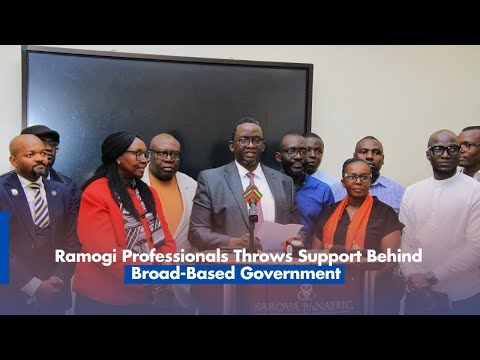

There are words that, when repeated, gather a kind of incantatory power. Mentor is one of them. It has the ring of an invocation, like a reluctant prayer whispered in the ear of a bewildered initiate.
For years now, as an evolving scribe observing the goings-on in the world of words and art, I have been reminded of the old mechanics of Kirinyaga Road in the heart of Nairobi.
In scores, they learn their competencies by watching hands far more experienced than theirs dismantle an engine, lay it bare on the floor like the guts of an animal, and then coax it back to life with the authority of priests.
Apprenticeship is the real, if not original, university. It occurred to me early on that we, who deal in words rather than wrench sets, are not so different. We, too, percolate our craft through understudy, through a careful listening to masters and mistresses of the trade. The engines we repair simply happen to be human sentences of heartfelt emotions.
Scrolling through endless chatter on the writerly WhatsApp wall, you may think you are merely passing time. But look more carefully. You’ll see evidence of mentorship everywhere. A question asked gingerly in the morning is answered with the certainty of experience by noon. A shaky poem receives, by twilight, both praise and the gentle chiseling of chides.
This is not new to our city. The eminent belated bookmen, such as Jonathan Kariara, Prof CL Wanjala and Henry Chakava, did not begin as giants. A keen nose for literary history reveals that they began as copyeditors and subeditors in the fledgling Nairobi book industry in the early post-Independence decades.
They sharpened pencils before they sharpened generations. They learnt the unglamorous work first. And because they learnt, they rose. And because they rose, we are here talking about them in the comfort of the creative economies of now.
That is the secret no one tells young scribes: The industry remembers the apprentice far longer than it remembers the prodigy. In my role as an active, founding member of the Literature and Performing Arts Society of Kenya, I have watched mentorship unfold in ways too subtle to catalogue, especially in the online interaction of its writerly members on their WhatsApp wall.
A question asked in irritation becomes, months later, a published article or an idea forged into a book. A private message seeking advice becomes, with time, a new friendship.
Creative spaces, whether online or under an antique lusiola tree, are the soil from which literary futures germinate. They give writers a place to exchange anxieties disguised as drafts, to glean wisdom from the bruises of elders and to test the waters of their own emerging voices.
In my creative writing classes, I say it often: nobody grows alone. Even the most solitary writer is shaped by the echoes of others. Look at my own life. For 26 years as a scribe, each page I have written, whether praised or rightly ignored, has been shaped by voices older, wiser or simply kinder.
Binyavanga’s laughter still punctures my memories. Micere’s firmness still steadies my wavering hand. Ngugi’s discipline, Bukenya’s elegance, Yvonne’s fearlessness, Imbuga’s wit, Kabaji’s sharpness, Vassanji’s exactitude, Mochama’s humour.
These influences do not fade. They accumulate, like sediments of a river, until they harden into the bedrock on which one stands. Mentorship, even when informal, leaves geological marks.
I say all this to the young scribe lurking quietly in our literary and art ecosystems. Seek out creative communities. Go to readings at the French Cultural Centre, or the German cultural outpost whose name we always mispronounce.
Wander into the gatherings of Kistretch. Attend the virile sessions of the Kakamega Book Club, where discussions become debates and debates become drinking sessions, and yet books remain at the centre of things.
And if you are involved in any of joint book projects, please, I beg you, share your work early with each other in the spirit of peerage and mentorship. Rough work is the clay from which fine work is shaped. Hide it for too long and the clay dries. When mentorship finds you, accept it with the humility of one entering holy ground, but also with the courage to push back.
That, too, is part of the apprenticeship. I myself have questioned the great Prof Peter Amuka and the formidable Prof Wangari wa Mwai, though always with the slight trembling that accompanies sincerity. They responded with patience. Mostly.
In the craft of writing, we have elders. They are not always loud. Some watch quietly until summoned. Pursue them. Ask your questions. Hold your arguments gently but firmly.
And when the moment comes, and it always comes, take on a mentee of your own. This is sacred duty for us scribes. The literary ecosystem of our country survives only through this circulation of generosity. A throat clears here, a manuscript is nudged there, and suddenly a writer steps into being.
Yes, writing is lonely. I know that loneliness intimately: the late-night wrestling with a sentence that refuses to behave, the mornings when the page stares back blankly, as though mocking your ambition. But to become a writer is not a lonely act. It is communal.
Once, in Berlin, on a spring afternoon fragrant with the arrogance of youth, I found myself addressing a gathering in a gallery near Unter den Linden. I stood there, half-sweater on, ropes of my reading glasses dangling behind me like the regalia of a distracted professor. I peered above the rim of my lenses at them, young writers of many countries, their eyes bright with hunger, and I said, “A single stone may bruise the foot, but many stones can build a home.”
They understood. You do, too. You must. Because there is no literature without tradition, and there is no art in the absence of mentorship. Each artist is a stone, capable of bruising when isolated, but capable of building when gathered.















![[PHOTOS] Ole Ntutu’s son weds in stylish red-themed wedding](/_next/image?url=https%3A%2F%2Fcdn.radioafrica.digital%2Fimage%2F2025%2F11%2Ff0a5154e-67fd-4594-9d5d-6196bf96ed79.jpeg&w=3840&q=100)


